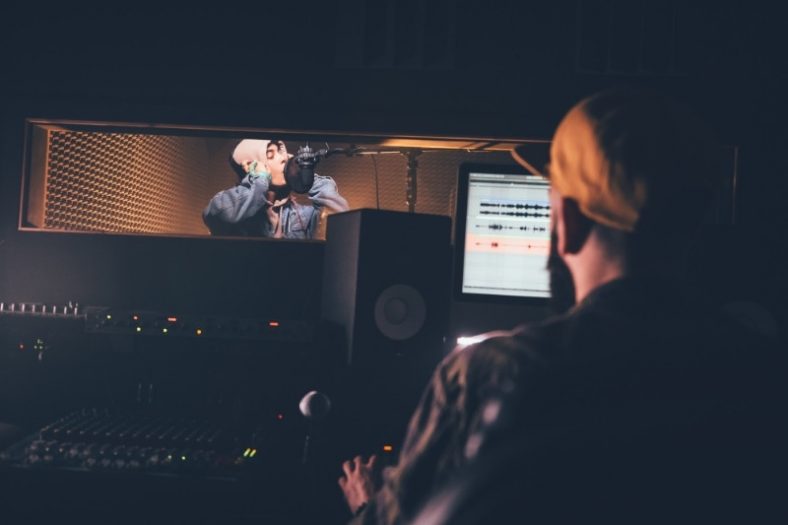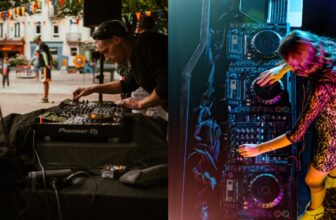What Does a Ghost Producer Do?

Ghost producers create music for other artists without being credited for the final product. Ghost producers can collaborate with artists in many ways: they can create entire tracks, contribute with just a few corrections, or sing and play instruments without being credited for their performance.
The concept of a ghost producer is similar to the concept of a ghostwriter, except it applies to music production instead of literature. Ghost producers are generally paid for their work and agree to let go of their authorship rights beforehand. The end product made by ghost producers is later released by artists as if it was their own.
Ghost production is incredibly prevalent in today’s music scene, especially in genres such as EDM and hip-hop. However, popular artists seldom admit they have used the services of ghost producers. Despite being common, ghost production is still taboo, as many believe it’s morally wrong to rely on the services of uncredited musicians.
Contents
Why is ghost production such a controversial topic?
Ghost production is a controversial topic because many people believe it’s wrong to take credit for the work of others. The idea that credit belongs where credit’s due is more prevalent in the music business than in other industries. This relates to the notion that authenticity is important in art.
Not to be confused with Walter Benjamin’s concept of authenticity, nominal authenticity is the term used to describe “the correct identification of the author of a work of art.” It’s hard to put into concise words why so many people value the concept of nominal authenticity in art. However, it likely relates to the commodification of art.
In art forms like painting and sculpture, collectors are willing to pay vast sums for objects of art only if they are nominally authentic. Because authentic art has always been more valuable than forged art (even if they are virtually indistinguishable), it’s natural that people still value authenticity in art today.
The debate around DJ Khaled, for instance, is a fine example of how the morals of nominal authenticity are still a part of society’s mindset.
On the other hand, the hate around ghost production may be more rooted in human emotion than human philosophy. Because artists hide the truth about the real creator or creators of their music, they can be viewed as liars. The secrecy around the topic of ghost production can also help to fuel the idea that the practice is dishonest or, at the very least, morally dubious.
How many types of ghost producers are there?
Ghost producers can perform a wide variety of functions, but there are two major types of ghost producers: the ones who complete an entire track or album and sell it to an artist, and the ones who work as part of an artist’s team but aren’t credited for their work.
In 2015, DJ Mag asked their top 100 DJs about what they thought of ghost producers. A majority of 67% supported the practice, even though many were against the use of ghost producers who delivered complete tracks for DJs.
Getting back to the moral debate around ghost production, it seems that most fans and artists believe it’s way worse to buy complete tracks off someone else and promote it as your own than simply enlisting the services of uncredited musicians, producers, or mixing engineers to help you make a track better.
The role of ghost producers who collaborate in the improvement of a track that already exists can be compared to the role of a session musician, who shows up to perform in the studio, gets paid, and goes away without ever being given authorship rights over his or her performance.
With that in mind, it’s important to mention that many popular artists pay their collaborators and also credit them for their work. According to Complex, the rapper Kanye West “has no problem sharing the credit for his work” and likes to promote the “ghost” producers that assist him in the studio.
Why do artists use ghost producers?
There are several legitimate reasons why artists use ghost producers. A lack of time, a need to grow, a lack of technical knowledge, or a specific musical need are among the most common motives why even talented artists rely on ghost producers.
Lack of time
Popular artists often need to meet unrealistic deadlines, so it makes sense that they employ other people to perform tasks that are extremely time-consuming but not as creative. This includes, for instance, the highly technical task of mixing and mastering a track or the tedious job of cleaning up vocals, aligning drum sounds, and organizing DAW projects.
Need to grow
The need to grow fast can also convince artists to rely on the services of a ghost producer. A newcomer rapper who landed a major number-one hit and needs to add new songs to his collection, for example, may feel tempted to hire ghost producers and ghost lyricists to release new tracks before the hype goes away.
Lack of technical knowledge
Because not even the most talented artists around know how to do everything, it’s only natural that some hire ghost producers to perform tasks they’re simply unable to do. A beatmaker with no knowledge of music theory, for instance, should have no issues with hiring a ghost producer for performing a highly technical guitar solo on one of his tracks.
Specific musical need
Similarly, the same artist should be okay with hiring ghost producers for filling a specific need. The most common example is the one of a male artist who needs a female singer to perform back vocals in one of his tracks.
Needless to say, artists are never obligated to hide the identity of their collaborators. However, it’s worth noting that some ghost producers want to stay ghost producers. Often, ghost producers don’t identify with the work of the people they’re hired by and prefer to “remain in the shadows.”
Some ghost producers even use the money they make by producing for others to finance their own musical careers. The Australian dance-music duo NERVO, for example, stated that they “started off as ghostwriters and used this as a platform to launch our own careers when the time was right for us to become artists.”
What famous artists use ghost producers?
It’s not easy to find out about all the artists who use ghost producers. However, many have been outed in the past. Because ghost production is particularly prevalent in the dance music scene, most of these artists work as DJs.
Some of the best-known include the American record producer Diplo, the American DJ Steve Aoki, the iconic Dutch DJ Tiësto, and the Canadian production duo DVBBS.
The German-French R&B Milli Vanilli is one of the few acts outside of the dance-music scene to have been outed in the press.
Verdict
So, is ghost production right or wrong?
Well, if ghost production helps to make the final product better, shouldn’t music fans and artists support it? Is nominal authenticity truly that important in today’s music scene? Or should music fans, as suggested by the author Matt Anniss, ask themselves about “what counts as being “authentic” in this day and age?”
Aren’t songs just another product made to be consumed by society? If nobody cares about the “real” authors of the iPhone, why should anyone care about the “real” authors of DVBBS & Bourgeous’ “Tsunami?”
Whether you support ghost producers or not, two things are for sure: they are here to stay and they will continue to give us plenty of food for thought.





